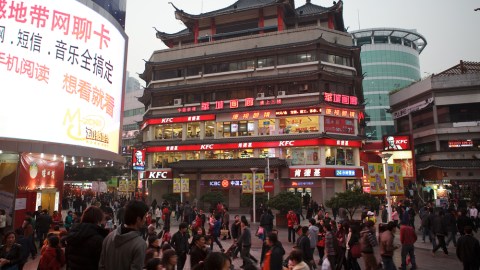Sign up for Big Think on Substack
The most surprising and impactful new stories delivered to your inbox every week, for free.
What is the Big Idea?
Best Buy, Pepsi, General Electric, Intel, Phillips and Nestle.
What do these multinational companies have in common? They’ve all penetrated China’s retail market, but that is where their similarities end.
General Electric, Intel and Phillips have found a home in China, while Best Buy, Pepsi and Nestle have had to make a “strategic retreat” from its market. So how did two polar opposite trends emerge from the same country? The answer underscores the highly competitive landscape of multinational companies operating in China’s market, according to Xie Zuxi’s article in The Economic Observer.
Read the full story in English or Chinese.
What is the Significance?
The vast and rapidly changing Chinese market is placing pressure on foreign firms to focus on development or sometimes, just survival.
“China is a new economy,” said Xie. “Strictly speaking, the opening up of China started from Deng Xiaoping’s ‘Southern Tour’ in 1992. The country’s vast economic development is thus only 20 years old, a relatively short period. The Chinese government, as well as businesses and customers, are still in the process of learning and exploring what exactly is this ‘social market economy with Chinese characteristics.'”
Xie identifies three common faux pas that foreign firms commit.
China’s market development is particularly fast and the competition fierce. Numerous foreign firms can’t keep up with the pace of an ever-evolving market. A lot of them simply transplanted their products, services and business models from other parts of the world to China without any deeper understanding of their Chinese customers. Meanwhile China is producing a local business force of tens of thousands of businessmen who are very strong competitors. They know and live closer to the local customers, and they focus on producing cheaper alternative products. They also emphasize marketing and distribution, and they develop new products and innovative sales models that cater much more to the needs of the Chinese.Many foreign firms neglect the huge potential for development in the third and fourth-tier cities. Even though most of them are aware of these markets, they somehow fail to operate effectively in these places. These smaller cities give Chinese enterprises an excellent chance for development and in turn they work upwards to the third and second-tier cities.The headquarters of these multinationals back in their home country often suffer from unrealistic expectations of their business in China, while their top managers in China often fail to clearly report the real situation back to headquarters. In addition, the frequent replacement of their expatriated managers does not help, while some of their CEOs come to the Chinese market once or twice each year and imagine they know China thoroughly.What Can We Learn From China’s Top Performers?
Mark Norbom, President and CEO of General Electric in China refers to the country its “second home,” and includes China in its overall business strategy.
Danfross, producer of air conditioner and refrigeration components, made China their second base. Since entering the market in 1996, China has become their third largest market and second largest employee base.
IBM, the most successful example, moved their global procurement division from upstate New York to Shenzhen which in turn strengthened their supply chain. They’ve since opened a second headquarter in Shanghai to cater to the emerging markets in Asia, Latin America, Russia, Eastern Europe, the Middle East and Africa.
Xie offers two rules that multinational firms need to follow:
The leader of the Chinese team is critical. The success of many enterprises is due to the fact that the person at the helm was given enough time to develop the business in China. Some have even become legendary figures. Su Jingshi, the Taiwanese director that expanded Kentucky Fried Chicken’s rapid occupation of the vast Chinese market; Li Hexun, the Hongkongese President of Tetra Pak, the Swedish firm that is the world’s largest food packaging company; and Zhu Xi, the Chinese president for the greater China Region of General Mills.The successful foreign firms in China is the steadiness and coherence in both projections and operations. The firms that failed tend to be either too optimistic and overly invested, and wind up taking too long to achieve profits. Others were too conservative, entering China with a “testing” state of mind.“Success requires thorough knowledge of the needs and size of the Chinese market, the level of resources required, and a willingness to explore relevant aspects of their services,” said Xie. “Multinational giants in China must find the right way to continuously adjust their business models.”
Sign up for Big Think on Substack
The most surprising and impactful new stories delivered to your inbox every week, for free.






